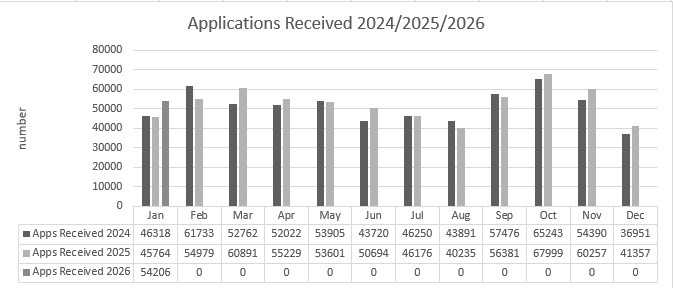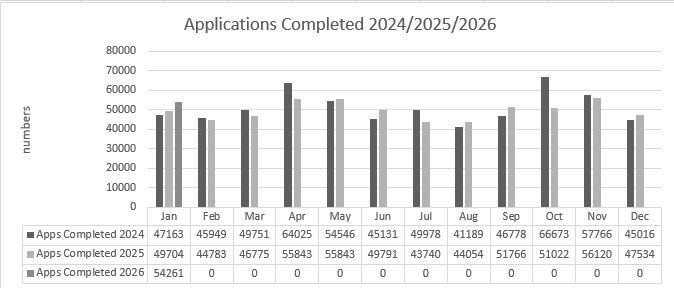This eVetting system was specifically designed to ensure speedy processing of vetting applications. The eVetting service provides for a 14 day turnaround for 80% of applications received via the system. In addition, the system has streamlined the entire vetting process, given more visibility to both organisations and applicants and contributed to a sustained reduction in processing times for applications.
The National Vetting Bureau will provide Registered Organisations* with the opportunity to process applications online using our eVetting facility.
Apply Online Via Registered Organisation
Applicants will be invited to apply online by the Registered Organisation from whom they are seeking vetting.
To use this service applicants must:
- be over 16 years old
- if aged 16-18 years, have submitted signed “Parent / Guardian” consent form
- have or have access to a valid email address
- have access to the Internet
- have completed the 'Proof of Identity' process
Track Your Application Online
A key feature of the eVetting system is that the individual applicant can track progress of their own vetting application online and can, therefore, see when their application has been processed and returned to the relevant registered organisations.
To apply, visit the National Vetting Bureau website here.
Postal Applications
Paper Garda Vetting applications will also be accepted once they are submitted in accordance with the National Vetting Bureau (Children and Vulnerable Persons) Acts 2012 to 2016. New National Vetting Bureau application and parental consent forms are available from all registered organisations.
*A relevant organisation means a person (including a body corporate or an unincorporated body of persons) who employs, enters into a contract for services or permits any person to undertake relevant work or activities, a necessary and regular part of which consists mainly of the person having access to, or contact with, children or vulnerable adults.
This eVetting system was specifically designed to ensure speedy processing of vetting applications. The eVetting service provides for a 14 day turnaround for 80% of applications received via the system. In addition, the system has streamlined the entire vetting process, given more visibility to both organisations and applicants and contributed to a sustained reduction in processing times for applications.
The National Vetting Bureau will provide Registered Organisations* with the opportunity to process applications online using our eVetting facility.
Apply Online Via Registered Organisation
Applicants will be invited to apply online by the Registered Organisation from whom they are seeking vetting.
To use this service applicants must:
- be over 16 years old
- if aged 16-18 years, have submitted signed “Parent / Guardian” consent form
- have or have access to a valid email address
- have access to the Internet
- have completed the 'Proof of Identity' process
Track Your Application Online
A key feature of the eVetting system is that the individual applicant can track progress of their own vetting application online and can, therefore, see when their application has been processed and returned to the relevant registered organisations.
To apply, visit the National Vetting Bureau website here.
Postal Applications
Paper Garda Vetting applications will also be accepted once they are submitted in accordance with the National Vetting Bureau (Children and Vulnerable Persons) Acts 2012 to 2016. New National Vetting Bureau application and parental consent forms are available from all registered organisations.
*A relevant organisation means a person (including a body corporate or an unincorporated body of persons) who employs, enters into a contract for services or permits any person to undertake relevant work or activities, a necessary and regular part of which consists mainly of the person having access to, or contact with, children or vulnerable adults.
The National Vetting Bureau (Children and Vulnerable Persons) Acts 2012 was amended by the Oireachtas in January 2016. The key purpose of the amendments was to provide that certain old minor convictions would not be disclosed in vetting disclosures, and to harmonise certain provisions in the 2012 Act with provisions in the Criminal Justice (Spent Convictions and Certain Disclosures) Act 2016.
The National Vetting Bureau (Children and Vulnerable Persons) Acts 2012 to 2016 provides a legislative basis for the mandatory vetting of persons who wish to undertake certain work or activities relating to children or vulnerable persons or to provide certain services to children or vulnerable persons.
The national unit of An Garda Síochána known before as the Garda Central Vetting Unit shall, after the commencement, be known as the National Vetting Bureau. All communications will thereafter emanate from the National Vetting Bureau.
To visit the National Vetting Bureau website, click here.
The Garda Criminal Records office (C.R.O.) as it was then called was first established in 1871 in the Royal Constabulary. In 1922 An Garda Síochána was established, following the disbandment of the Royal Irish constabulary, and the Criminal Records Office continued in operation in Dublin Castle. With the establishment of the Fingerprint Section in the Garda Technical Bureau in 1934, Dublin Criminal Records Office (D.C.R.) was based in the Fingerprint Section. D.C.R. and C.R.O. were amalgamated in 1973 when the section was computerised. Until 1993, a card index system was maintained and checked alongside the computer enquiry.
Functions of the GCRO
The Garda Criminal Records Office is now based in the National Vetting Bureau, Thurles and has responsibility for the following broad functions:
- Carrying out Criminal Record Checks on behalf of HRM, Garda Headquarters for Garda applicants, Garda Reserve applicants and Foreign Police applicants
- Carrying out Criminal Record Checks on behalf of the Probation Service
- Carrying out Criminal Record Checks on behalf of the Court Service in respect of individuals on jury lists
- Updating and maintaining the Garda Criminal Records database
- Validating historical manual DCR files against information recorded on PULSE
- Validation and updating (when required) of prison forms
- Receiving and recording criminal records from the PSNI
- Requesting criminal records from the PSNI
Background
National courts often pass sentences on the basis of past convictions an offender has in their national register. They do not take into account convictions in other EU countries. As a result, offenders could escape conviction by moving to another country.
Connecting national criminal databases
The European Criminal Records Information System (ECRIS) was established in 2012 in order to improve the exchange of criminal records throughout the EU. All EU countries are currently connected to ECRIS.
Within the ECRIS Framework each EU state is responsible for establishing a Central Authority for Criminal Records within their state. The National Vetting Bureau has been designated as the Central Authority for Ireland. Currently the NVB conducts the hereunder four actions within this framework:
- Make requests to the Central Authorities in other Member States for extracts from their National Criminal Record in respect of Nationals of the Member State concerned in instances where the information is required in connection with criminal proceedings in the requesting State.
- Respond to requests from the Central Authorities in other Member States for extracts from the National Criminal Record in respect of Nationals of the requested Member State, in instances where the information is required in connection with criminal proceedings in the requesting Member State.
- Receive, store, and update where necessary, the National Criminal Record, information received from Central Authorities in other Member States in respect of Nationals of the receiving State convicted in those other Member States.
- Transmit information, and any necessary updates, in respect of criminal convictions imposed in the transmitting State on all Nationals of other EU Member States to the Central Authority of the Member State of the convicted person.
How to be Vetted for a “Volunteer” Role
The Garda National Vetting Bureau (The GNVB) has received many queries from members of the public, enquiring about how they can volunteer to help out in their community, and how they are vetted for such roles.
Volunteer Ireland and the Network of Volunteer Centres have some excellent advice about Volunteering on their website www.volunteer.ie Volunteer Ireland can be contacted on 087 765 8472 or via e-mail info@volunteer.ie
If you wish to volunteer, you can also directly contact your Local Volunteer Centre, to enquire about what type of volunteering is most needed in your community, or you can sign up online at www.i-vol.ie.
Vetting for volunteer roles is coordinated by Volunteer Organisations who are registered with The GNVB as a “Relevant Organisation”.
Not all volunteering roles will require Garda Vetting. If the position you are volunteering for does require Garda Vetting, this will be organised through your Local Volunteer Centre.
Garda Vetting Statistics (updated monthly)
Applications Received
| Total Applications Received | |
| 2026 | 54,206 |
| 2025 | 633,563 |
| 2024 | 614,661 |
| 2023 | 585,576 |
| 2022 | 549,198 |
| 2021 | 432,661 |
| 2020 | 384,077 |
| 2019 | 487,683 |
| 2018 | 520,690 |
| 2017 | 497,045 |

Applications Completed
| Total Applications Completed | |
| 2026 | 54,261 |
| 2025 | 596,975 |
| 2024 | 613,965 |
| 2023 | 588,690 |
| 2022 | 533,644 |
| 2021 | 426,090 |
| 2020 | 380,746 |
| 2019 | 491,181 |
| 2018 | 517,794 |
| 2017 | 469,158 |

Results
*All figures are provisional and subject to change. Figures are current as of the 31 December 2025.
